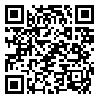Volume 81, Issue 1 (April 2023)
Tehran Univ Med J 2023, 81(1): 38-48 |
Back to browse issues page
Download citation:
BibTeX | RIS | EndNote | Medlars | ProCite | Reference Manager | RefWorks
Send citation to:



BibTeX | RIS | EndNote | Medlars | ProCite | Reference Manager | RefWorks
Send citation to:
Tajvar M, Pourfarokh P, Bahmanziari N, Jaafaripooyan E, Nazari M, Sajadi H S. Management of cosmetic surgery in iran: challenges and solutions. Tehran Univ Med J 2023; 81 (1) :38-48
URL: http://tumj.tums.ac.ir/article-1-12330-en.html
URL: http://tumj.tums.ac.ir/article-1-12330-en.html
Maryam Tajvar * 
 1, Parisa Pourfarokh1
1, Parisa Pourfarokh1 
 , Najmeh Bahmanziari2
, Najmeh Bahmanziari2 
 , Ebrahim Jaafaripooyan1
, Ebrahim Jaafaripooyan1 
 , Maryam Nazari1
, Maryam Nazari1 
 , Haniye Sadat Sajadi3
, Haniye Sadat Sajadi3 


 1, Parisa Pourfarokh1
1, Parisa Pourfarokh1 
 , Najmeh Bahmanziari2
, Najmeh Bahmanziari2 
 , Ebrahim Jaafaripooyan1
, Ebrahim Jaafaripooyan1 
 , Maryam Nazari1
, Maryam Nazari1 
 , Haniye Sadat Sajadi3
, Haniye Sadat Sajadi3 

1- Department of Health Management, Policy and Economics, School of Public Health, Tehran University of Medical Sciences, Tehran, Iran.
2- Translational Ophthalmology Research Center, Tehran University of Medical Sciences, Tehran, Iran.
3- Knowledge Utilization Research Center, University Research and Development Center, Tehran University of Medical Sciences, Tehran, Iran
2- Translational Ophthalmology Research Center, Tehran University of Medical Sciences, Tehran, Iran.
3- Knowledge Utilization Research Center, University Research and Development Center, Tehran University of Medical Sciences, Tehran, Iran
Abstract: (910 Views)
Background: Nowadays, beauty practices have attracted the attention of people following the change in lifestyle and social values. Therefore, the present study was conducted with the aim of examining the opinion of experts regarding the challenges and management solutions of the aforementioned practices in Iran.
Methods: This qualitative study was conducted through interviews with 26 policymakers and cosmetic surgery service providers in Tehran from April to September 2022. Sampling was purposeful and snowball. The interviews were semi-structured and thematic analysis was used to analyze the data obtained from the interviews. The inclusion criteria for the interviewees' entry were knowledge and experience in the subject and willingness to participate.
Methods: This qualitative study was conducted through interviews with 26 policymakers and cosmetic surgery service providers in Tehran from April to September 2022. Sampling was purposeful and snowball. The interviews were semi-structured and thematic analysis was used to analyze the data obtained from the interviews. The inclusion criteria for the interviewees' entry were knowledge and experience in the subject and willingness to participate.
|
Results: Challenges under the four categories of service providers (improper education, non-specialist providers, moral hazards, deficiencies in the way laws are written, and the ineffectiveness of the complaint handling process), service receivers (being influenced by deceptive advertisements, low level of public health literacy and lack of mental health), the place of providing services (performing surgeries in non-standard places and non-integrated information system) and medicines, products and medical equipment (insufficient control over supply, distribution and use and price fluctuations) were categorized. Experts considered the major part of the challenges to be related to the service providers. In the category of service recipients, "being influenced by deceptive advertisements" was the main problem mentioned by the experts. Performing surgeries in non-standard places, including limited surgery centers, non-sterile places, and unauthorized places, is among the unsolved problems regarding the place of providing services. In relation to medicines, products, and medical equipment, the main problem was insufficient supply, distribution, and use supervision.
Conclusion: The main effective measure to solve the challenges is to strengthen the supervision of the health system administrator with internal and external coordination and cooperation. In this regard, it is recommended to develop educational, ethical, and legal frameworks, regulate regulatory laws, public awareness, clinical interviews and psychological counseling, especially before cosmetic surgery, and the establishment of an integrated electronic health record system. |
Type of Study: Original Article |
Subject:
Endocrinology
| Rights and permissions | |
 |
This work is licensed under a Creative Commons Attribution-NonCommercial 4.0 International License. |



